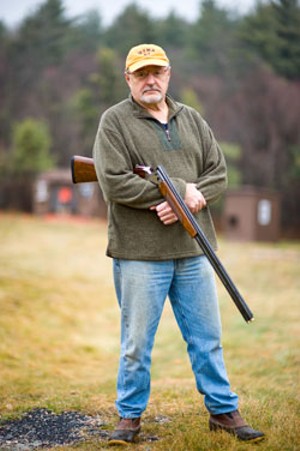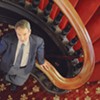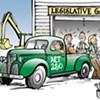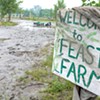Published November 18, 2009 at 9:11 a.m.
Mona and Leo Boutin used to raise beef cattle on their picturesque Williston farm. The cows would graze in the grassy field that sweeps up to the forest line, and drink from the babbling brook that cuts through the couple’s land.
That was before the Boutins worried about lead contaminating their groundwater. Water experts have since collected samples from the creek, and the couple has stopped drinking the well water.
The Boutins live next door to the North Country Sportsman’s Club shooting range off Old Creamery Road. For 47 years, club members have been blasting clay pigeons out of the sky, raining pulverized skeet and lead shot into the soil.
The gun club’s owners assured the Boutins their property had been tested, and was safe. But the couple was not convinced. So they hired a private company from Waterbury to test water samples from the stream. In June, Environmental Compliance Services took samples from three locations in the stream flowing behind their home. The “midstream” and “downstream” samples came in below the National Academy of Sciences’ “threshold value” for lead accumulating in the body.
But the “upstream” sample — from closest to the gun club — showed 0.09 milligrams of lead per liter, almost twice the safe limit for livestock and just shy of what health experts deem the “upper limit for toxic substances in water.”
The tests couldn’t confirm the shooting range as the source of the contamination, but the Boutins and their neighbors are convinced it is the culprit.
“We have no proof it’s coming from the gun club, but there’s nothing else out there,” says Leo Boutin, a third-generation steward of the family farm now owned by his mother. “Nobody should be allowed to dump toxic waste like this.”
The owner of the shooting range, Tom Blair, isn’t ready to accept the blame. He notes that only one sample of the three taken showed elevated levels of lead, and says the contamination could be occurring naturally.
“There are trace elements of lead everywhere,” says Blair. “It’s a common metal throughout the environment. Until there is further testing done, and until people know what they’re looking at and analyze it, I don’t think we really know what it means.”
Neighbors of the shooting range agree more testing should be done, and they want the gun club to pay for it.
Homeowners have formed a coalition called Lead Free Williston and sent their independent water test results to the state Agency of Natural Resources (ANR). They’re asking the state to investigate North Country and, in the event it is polluting, make the club pay for extensive testing of well water at homes around the range.
Their pleas might fall on deaf ears. George Desch, now director of the Waste Management Division for the Department of Environmental Conservation, addressed Williston residents at a meeting last December. He explained that federal law exempts gun clubs from regulation because the metal is being used for its “intended purpose.” Only abandoned sites polluted with lead will get the state’s attention.
Sabina Haskell, deputy secretary of Vermont’s ANR, says her office has received the Boutins’ complaint and has asked the Boutins for more information about where and how the water samples were taken before investigating further.
“We get studies all the time and you need to put them into perspective,” Haskell says.
Lead poisoning attacks the nervous system and causes cognitive impairment. Symptoms include learning difficulties, abdominal pain, weight loss and vomiting.
One of the club’s concerned neighbors, Dr. Rob Nesbit, has seen the harmful effects of lead poisoning first-hand. Nesbit treated patients in Tennessee who were sickened because they ran moonshine liquor through lead-lined car radiators to cool it down.
“You’d lift up their lip and along the gum line there’d be something called a lead line,” says Nesbit, now a surgeon at Fletcher Allen Health Center.
Four years ago, Nesbit moved into a brick Williston farmhouse with his wife, Julia. They now have two young children — ages 3 years and 11 months. At first, he didn’t think much of the gun club. He was raised in the South and grew up shooting guns — he even shot skeet during recess in ninth grade.
But, like the Boutins, Nesbit grew more concerned about lead contamination over time and eventually joined the group of neighbors fighting to force the club to clean up its property. Nesbit says he supports the right to bear arms, but not when it harms the environment.
“Lead leeching into the ground is not a Second Amendment right,” he says. “They basically created a big toxic waste dump there.”
The U.S. Environmental Protection Agency has established a set of “best practices” for shooting ranges, and Lead Free Williston wants the club to follow them. Among the EPA’s recommendations: reclaiming and recycling lead shot, which sells for around 50 cents a pound on the open market; switching to nontoxic metals such as stainless steel or copper for shotgun shells; building berms to contain lead shot; and covering the soil with lime to reduce acidity and prevent lead shot from breaking down.
“We want the gun club to step forward, be responsible for using lead, a known toxin, and put in place best management practices set by [the] EPA,” says Jessica Edgerly of Toxics Action Center, an antipollution group assisting the Williston homeowners. “This is a shot across the bow.”
Tom Blair says his shooting range has already implemented some of the EPA’s recommendations. He calls others too expensive or impractical.
Reclaiming the lead hasn’t been “feasible,” Blair says, because the club’s terrain is rocky and uneven. The machines used to sweep and collect the shot wouldn’t really work there.
Steel shot is expensive, not widely available and doesn’t work with some of the shotguns used by club members, Blair says.
Berms don’t “accomplish any purpose,” Blair says, and the club has already spread four tons of lime on the property to neutralize the soil’s pH level and prevent corrosion of the lead.
Blair acknowledges the shooting range pumps some 7500 pounds of lead a year onto club property, but says concerns over the lead the Boutins found in their stream is “premature.”
“We have a single sample,” he says. “The likelihood that anyone else could possibly be affected is virtually nil because most of the neighbors are a long way away from the club or actually at higher elevations.”
Blair says the club drew water samples last year from its well and a spring-fed pool, and sent them to a Florida lab for testing. Shared publicly for the first time through Seven Days, the results indicate lead levels in both samples were below the detection limit of 1 part per billion. (The EPA’s action level for lead in drinking water is 15 parts per billion.)
Edgerly says those results might be valid, but says they raise more questions than they answer. How deep is the club’s well? What’s the hydrogeology of the spring, and how would that affect lead readings? Would results be different if an independent expert drew samples from the water sources most vulnerable to contamination, instead of just turning on the tap?
“I don’t discount their results,” Edgerly says, “I just don’t consider them complete.”
Until they know for sure, the Boutins have turned off their taps. The couple bought a water cooler from Hannaford this summer and use only bottled water for drinking and cooking.
The 5-gallon cooler sits in their kitchen, a reminder of the ongoing uncertainty over the quality of the groundwater. Leo Boutin calls his property “paradise” but worries about whether it’s being poisoned.
“The farm will be left to us,” Leo Boutin says, “but what good is it if it’s covered in toxic waste?”
More By This Author
Speaking of...
-

The Pending Sale of Williston's Isham Family Farm Exposes Fragility in the Agricultural Succession Model
Mar 26, 2024 -

Pair Will Share Oaxacan Heritage at El Comal in Williston
Jan 9, 2024 -

Aromas of India Cooks Up Vegetarian Comfort Food in Williston
Oct 24, 2023 -

Seven Sweet Summery Spots for Frozen Treats
Aug 1, 2023 -

Sarita’s Kitchen to Open Aromas of India in Williston
Jun 27, 2023 - More »
Comments
Comments are closed.
From 2014-2020, Seven Days allowed readers to comment on all stories posted on our website. While we've appreciated the suggestions and insights, right now Seven Days is prioritizing our core mission — producing high-quality, responsible local journalism — over moderating online debates between readers.
To criticize, correct or praise our reporting, please send us a letter to the editor or send us a tip. We’ll check it out and report the results.
Online comments may return when we have better tech tools for managing them. Thanks for reading.













































